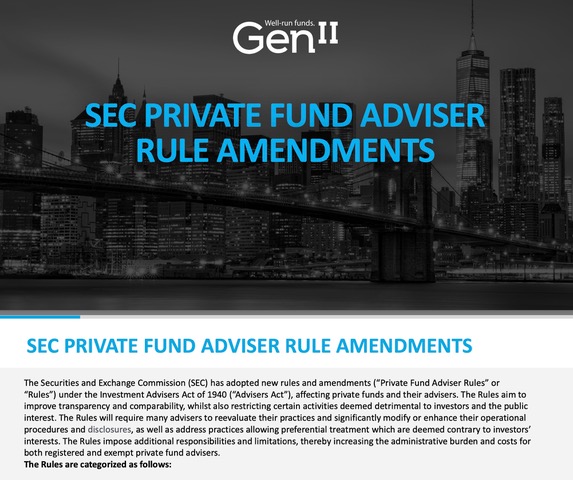Insights
Article
A Guide to The SEC’s New Private Fund Adviser Rule Amendments

Authored by: Merryn Rosewall, Principal, Risk & Quality Control
Published on: August 29, 2023
The Securities and Exchange Commission (SEC) has adopted new rules and amendments (“Private Fund Adviser Rules” or “Rules”) under the Investment Advisers Act of 1940 (“Advisers Act”), affecting private funds and their advisers. The Rules aim to improve transparency and comparability, whilst also restricting or prohibiting certain activities deemed detrimental to investors and the public interest. The Rules will require many advisers to reevaluate their practices and significantly modify or enhance their operational procedures and disclosures, as well as address practices allowing preferential treatment that are deemed contrary to investors’ interests. The Rules impose additional responsibilities and limitations, thereby increasing the administrative burden and costs for both registered and exempt private fund advisers. The Rules are categorized as follows:
- Quarterly Statement Rule
- Private Fund Audit Rule
- Adviser-Led Secondaries Rule
- Restricted Activities Rule
- Preferential Treatment Rule
- The Compliance Rule
The Quarterly Statement Rule, the Private Fund Audit Rule, and the Adviser-Led Secondaries Rule are applicable to Registered Private Fund Advisers. The Restricted Activities Rule and the Preferential Treatment Rule are applicable to all Private Fund Advisers. The Compliance Rule Amendments are applicable to all Registered Advisers. Additionally, the Rules introduced amendments to the recordkeeping requirements for Registered Private Fund Advisers in respect of the above.
The Rules will be effective 60 days after their publication in the Federal Register. There is a 12-month transition phase for advisers with private fund assets under management (“AUM”) of $1.5 billion or more and 18 months for advisers with private fund AUM below $1.5 billion, which does not apply to the Quarterly Statement Rule and the Private Fund Audit Rule as they will have an 18-month transition period irrespective of their AUM.
The Rules represent a pivotal shift in the private fund industry. To adapt to these changes and build investor confidence, it is crucial for private fund advisers to proactively address compliance. It is advisable to engage experts, including accountants, legal professionals, and third-party administrators, and monitor updates to facilitate the adoption of these new Rules.
If you have questions, contact your Gen II Client Service Manager or gen2reg@gen2fund.com.
Below is a summary of the new Private Fund Adviser Rules and recommended courses of action. For full details, see the SEC’s Fact Sheet, Final Rule, and Press Release.
The SEC’s New Private Fund Adviser Rule Amendments
Quarterly Statement Rule
- Applicable to RIAs Only
- 18-Month Transition Period
Rule:
Quarterly statements are to be distributed to private fund investors containing detailed information on:
- Fund fees and expenses;
- Compensation paid to the RIA and its affiliates by the fund and the portfolio investments, and any related fee offsets; and
- Standardized fund performance information (including year-to-date, annual, and since-inception returns up to ten years for liquid funds i.e., funds permitting investor redemptions. Illiquid funds to report performance with and without the impact of fund-level subscription facilities).
Statements must be delivered within 45 days (Q1-Q3) or 90 days (Q4) of quarter-end. For fund-of-funds, the deadlines are 75 days and 120 days, respectively.
Recommendation:
Perform a gap analysis with respect to the performance calculation and disclosure requirements of the Rules.
Private Fund Audit Rule
- Applicable to RIAs Only
- 18-Month Transition Period
Rule:
Each fund must be subject to an annual financial statement audit in compliance with the audit exception in Rule 206(4)-2 of the Advisers Act. Audited financial statements must be provided to investors within 120 days of the fund’s year-end (180 days for fund-of-funds). These financial statements must be prepared under US GAAP and audited by a PCAOB-registered and -inspected firm.
Recommendation:
Coordinate with your auditors and Gen II to ensure that the Rule requirements are met. If your fund was not previously audited, the initial audit will require greater effort since the auditor will need to gain comfort on the beginning-of-the-year balances.
Adviser-led Secondaries Rule
- Applicable to RIAs Only
- 12-Month Transition Period for Large Advisers (> =$1.5B AUM)
- 18-Month Transition Period for Small Advisers (< $1.5B AUM)
Rule:
Funds undertaking an adviser-led secondaries transaction are required to (i) obtain a fairness opinion or a valuation opinion and (ii) disclose any material business relationships between the adviser and the opinion provider during the previous two years.
Recommendation:
Prior to undertaking a secondaries transaction, identify a third-party service provider meeting the Rule requirements to provide the fairness or valuation opinion.
Restricted Activities Rule
- Applicable to All Private Fund Advisers
- 12-Month Transition Period for Large Advisers (> =$1.5B AUM)
- 18-Month Transition Period for Small Advisers (< 1.5B AUM)
Rule:
Restricts private fund advisers from undertaking certain activities unless they are disclosed, either before or after the event as prescribed and, where required, investor consent is obtained. “Consent” is defined as the approval by a majority in the interest of investors unaffiliated with the adviser. Limited Partner Advisory Committee approval is not sufficient.
Permitted Activities with Disclosure:
- Charging or allocating to the fund the adviser’s regulatory or compliance fees/expenses (Disclose within 45 days of the fiscal quarter end).
- Reduction of the GP’s clawback for taxes (Disclose pre-tax and post-tax clawback amounts within 45 days of the fiscal quarter end).
- Non-pro rata allocations across different funds of investment-related expenses pertaining to the same investment (Disclose before the fact, with an explanation as to why the allocation is equitable).
Permitted Activities with Disclosure and Consent:
- Charging or allocating to the fund fees/expenses relating to government or regulatory investigations of the adviser. Irrespective of disclosure or consent, such charge or allocation is prohibited if the adviser is sanctioned for violations of the Advisers Act or the Rules thereunder (“sanctioned matters”).
- Adviser borrowing from a fund.
“Legacy Status” applies to all existing agreements in place as of the Compliance Date other than those pertaining to “sanctioned matters”, which are not grandfathered.
Recommendation:
Review governing document provisions for prohibited activities and amend as appropriate.
Review and address the allocation and disclosures of adviser-related regulatory or compliance fees and expenses, and the requirement for obtaining and recording investor’s consent, where applicable.
Review and address the methodology and disclosures related to the non-pro-rata allocation of fees and expenses associated with portfolio investments. Review and address GP clawback pre- and post-tax disclosures.
Preferential Treatment Rule
- Applicable to All Private Fund Advisers
- 12-Month Transition Period for Large Advisers (> =$1.5B AUM)
- 18-Month Transition Period for Small Advisers (< 1.5B AUM)
Rule:
Prohibits the provision of preferential redemption terms or additional information on holdings and exposures to certain investors unless: (i) those terms or information rights are offered to all the fund’s investors (including investors in funds with similar portfolios) or (ii) preferential redemption rights are required by law. Other preferential terms must be disclosed to current and prospective investors. “Legacy Status” applies to all existing “legacy” preferential redemption and information rights agreements in place as of the Compliance Date. Legacy preferential redemption or information rights are not required to be offered to other investors. However, legacy status does not negate the requirement to notify all investors of other legacy preferential material economic terms.
Recommendation:
Review all existing side letters and investor agreements for preferential and unique terms. Develop disclosures to address the Rules for any side letters and agreements entered into after the effective Compliance Date.
Compliance Rule Amendments
- Applicable to RIAs Only
- 60-Day Transition Period
Rule:
Amends the existing Compliance Rule to require all RIAs, including those that do not advise private funds, to document in writing the required annual review of their compliance policies and procedures.
Recommendation:
Review procedures to verify that the annual compliance review is performed and documented in accordance with the Rules.
Explore Insights

Gen II Fund Services, LLC
1675 Broadway, 4th Floor
New York, NY 10019
212-408-0550
info@gen2fund.com
General Inquiries:
888-GEN2-001
Press Inquiries:
North America: tfaust@stantonprm.com
Europe: dan.jason@wearematerialimpact.com
Report Personal Data Breach >




